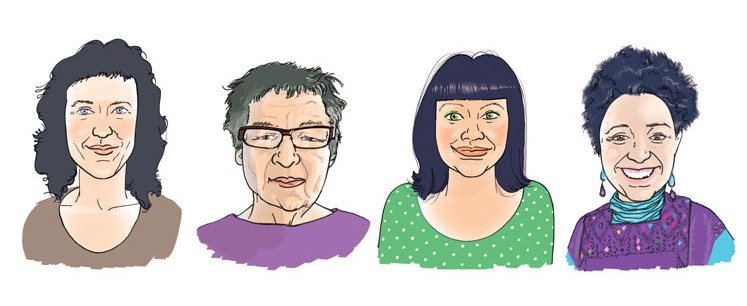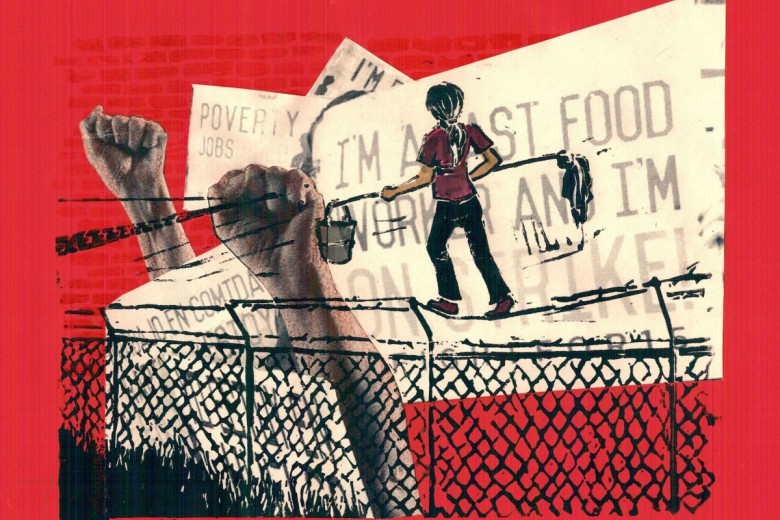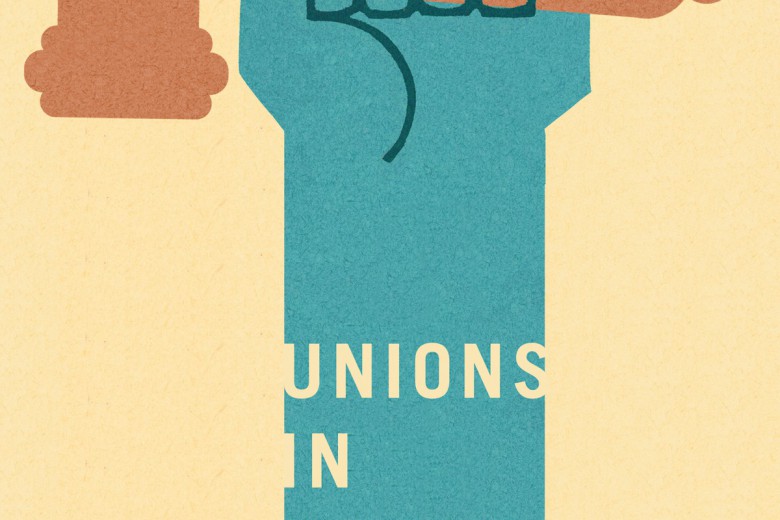
Do you think the decline of the labour movement is partially due to sexism and gendered understandings of work?

The labour movement still reflects the patriarchy, sexism, and racism of broader society. This is especially clear when examining who represents and speaks on behalf of labour. Union renewal will require addressing the representation of women and oppressed groups in fundamental rather than tokenistic ways. We need to force leadership to take notice and take sexism more seriously.

There are pockets of grassroots and community-led actions and organizing that address minority groups, but the broader labour movement needs to get better at including workers with precarious migration status. The labour movement has also contributed to the devaluing of unpaid work, which has a huge gender component.


I agree with everything others have said, particularly about the importance of organizing precarious and part-time workers. So I will just add an anecdote about sexism and organizing in the labour movement.
When I was organizing at Concordia in Montreal, it was a very male-dominated scene. Union organizing often tends to uphold traditional patriarchal structures of work: you have dedicated teams of organizers who work gruelingly long hours for the duration of the campaign; meetings are held in bars; there are no family supports, etc.
The prevalent organizing culture runs very much by the numbers, racking up those union certifications, dismissing issues of identity and representation, and showing little heed for the aftermath of the certification. As an organizer, have you helped to foster capacity among the members? Has the union nurtured the kinds of skills, relationships, and representation that will build the unit past its first contract? That’s how I think about organizing from a feminist perspective, but such questions were definitely not on the radar of my brothers on the almost all-male organizing team.
So it was a great respite for me when a sister came to help the drive and we went for a meal together. When I came back to the bar, the men seemed a bit put out that I had gone off with her. I felt the need to explain to the lead organizer that it was important to me to spend time with sisters. “Oh,” he said, “do you think we are too macho?” “Well, yes, actually, sometimes it does feel that way,” I replied. He told me he would think that over, which I truly thought was great. However, a couple weeks later, he told me he had consulted the male organizers and they all agreed I was wrong. End of discussion!
This experience illustrates perfectly for me how the labour movement often fails to meaningfully address sexism and gendered understandings of work. I don’t think the will is necessarily lacking. I think, as Nora says, it is a matter of taking these issues more seriously, which includes acknowledging the work of women in many movements. Gender issues aren’t a luxury, to be dealt with only when bread-and-butter issues have been tackled. We need to focus both on the broad-stroke policy issues and the ways in which everyday sexism divides us and sabotages our struggles.
Which workplace issues disproportionately affect women? Are these being addressed by current organizing efforts? What are the chief obstacles to women’s empowerment in workplaces?
Nora: When systemic issues arise in the workplace, they always disproportionately affect workers who hold oppressed identities. This means that for women (and especially non-white, disabled, queer, or trans women), any issue that arises in the workplace will impact them more than their male colleagues.
And, as work at home is still overwhelmingly done by women, any policies that reward workers who can spend more time at work will, obviously, hurt women more.
The reality is that women know the barriers they face, the issues they contend with, and how policies and procedures could improve our work lives. Unfortunately, women are often squeezed out of positions of power, either directly or indirectly, and are often overburdened by other responsibilities.
This is often the case both within the labour movement and on the left where women often take up the slack of male peers.
Finding ways to create spaces for women within unions, in a fundamental way, must be a priority. Women need to be encouraged to hold leadership roles. They need a public child care program that provides free child care. They need flexible leave time to take care of family members in need. They need to make as much as their male counterparts. And, they need to be supported by their union if they decide to take on leadership roles within the broader community.
Only when women make up a critical mass in decision-making will we see barriers removed in workplaces, and in this case, the labour movement is no different.
Wendy: The “everydayness” of women’s exploitation and oppression in the workplace and in broader society often gets overlooked. My entire working life has been as a nurse or performing related caring work in the community. These areas of work are female dominated both in numbers and character. The entry of more men into nursing and caregiving work over the last four decades has done very little to change the way in which nursing and similar occupations perceive themselves or are perceived from the outside.
I think most would identify gender-based pay equity as a key issue, and most unions that represent health care workers have taken this on and made significant gains. In the late 1980s and into the ’90s, our respective unions, certainly those representing registered nurses, fought for and won improved wages and benefits, better scheduling conditions, and increased safety in the workplace.
What has been largely ignored, however, are the broader issues emerging from women’s roles in the world more generally, as Nora outlines.
The dismantling and destruction of our social entitlements (our social wage) dramatically and disproportionately affects the lives of women. What is often called women’s “24-hour work day” has intensified as we try to juggle our time, energy, and resources, caring for children and aging parents, attending to the needs of families and our communities, at the same time as facing increased demands at work.
A key strategy of employers has been to introduce the “team concept” into the public sector, including health care. The team concept is a seductive construct that tries to convince workers in both the private and public sectors that the interests of the employer and of the workers are the same. Teachers, social workers, and health care providers in female-dominated occupations are particularly badly affected because we are already socialized into caring, nurturing roles.
The idea that we are all “one team” blurs power imbalances and hierarchical workplace arrangements. This makes it more difficult for women workers to recognize and acknowledge, let alone to resist, our oppression and exploitation as women.
The encroachment of lean, mean restructuring and the rationing of public services and social entitlements affects all working and poor people. Meanwhile, liberal feminism tends to lack class analysis and restricts itself to criticism of the glass ceiling and the issue of pay equity. A genuinely class-based feminism is urgently required.
Alejandra: In my experience and the experiences of the women and communities that I work with, one of the main issues here is sexual harassment. Women are often dismissed when they report their male co-workers or supervisors, and many workplaces don’t have adequate policies, if any at all, to address and stop harassment. Harassment is virtually encouraged in the service industry, for example, with dress codes that objectify women.
As Nora and Wendy suggest, the lack of appropriate child care options for working mothers and the absence of resources and policies specific to the needs of pregnant women is punishing, forcing women to accept unrealistic and inhumane conditions.
I see women working mostly in non-union workplaces where they are treated as disposable cheap labour and where they can be fired for speaking out. Instead of unions, I see front-line workers, women’s advocates, and women’s collectives supporting women in these situations, helping them take cases to human rights and employment standards tribunals, for example. And they try to target institutional barriers in a collective way.
Aalya: I want to see the labour movement throw all its might behind the struggle for a national program that provides universal, accessible, quality child care to all parents. We can do it. We need to do this. As a mother of small children, living in Quebec, I know what a difference the $7-a-day daycare system makes to our family, and even that system needs improvement because there is a huge waiting list and not enough spaces and the provincial government is cutting the budget. Lots of coalition organizing is happening around child care: a Rethink Child Care campaign has been signed onto by major unions and child care advocates, and a national conference, ChildCare 2020, is scheduled for Winnipeg this November.
When I say, “throw all its might behind,” I am not just referring to lobbying politicians to make a national child care program a reality or creating slogans, petitions, posters, etc. We need imaginative, audacious, and highly visible direct actions to get the public’s attention and keep child care front and centre until it is won. We need to rethink not only child care but how we value the work of caregivers.
As Wendy points out, a keystone of women’s oppression is the failure to address the overlaps between reproductive work, unpaid domestic labour, and wage labour. Unions could set a good example by ensuring subsidized child care provided by fairly compensated workers is available at each and every union function, including all local meetings. They could put negotiating better language around family responsibilities in collective agreements at the top of the priority list. They could highlight the inequities faced by caregivers as a key issue.
Communicating via “kitchen table conversations,” as the Rethink Child Care campaign is doing, is very powerful. It’s great to see an old feminist organizing tactic being redeployed using contemporary media. But I would like to see those kitchen table conversations ripple outward from the formal structures of union and advocacy work. I would also like to see the inclusion of home-based child care workers, live-in caregivers, and nannies, whose ranks include many racialized and immigrant women, in all these conversations. I’m hoping the upcoming conference will include lots of strategizing around getting public engagement, inviting home-based and independently organizing caregivers, and action, action, action!
What do you see as the most relevant and effective organizing efforts around work right now? How are women and women’s workplace issues included in these efforts?
Wendy: Any organizing efforts around work in this current period of austerity must address and counter the challenges and obstacles workers address at work as well as in our communities. There is a direct link between the attacks on our public services – health care, education, welfare, child care, employment insurance – and what is happening to workers in the workplace.
The most effective organizing, whether we are talking about organizing drives, collective bargaining, workplace safety, job security, scheduling language, wages and benefits, etc., has to take place within this larger social and political context. Unless the issues that affect us as workers are understood and opposed as inherently embedded within capitalism itself, we risk becoming irrelevant and of no use to working people.
Nora: I’m most hopeful and inspired by efforts to organize baristas in Halifax. Café workers represent a cohort of the service industry that has traditionally been outside of the labour movement. The Baristas Rise Up campaign has introduced young workers as the face of organizing while addressing the exploitative and precarious nature of coffee shop work. (I hear the coffee even tastes better when made by a unionized worker.)
It’s no coincidence that this organizing campaign is happening in a province where young workers are taking the reins of their workplaces like never before. Young workers hold elected positions, at both the labour council and provincial levels in Nova Scotia, and speak with confidence and candour. More inspiring is that young women are just as well represented as young men in these positions.
On the other side of the country, there’s the labour battle that raged on into September between the British Columbia Teachers’ Federation (BCTF) and the B.C. Liberals. The determination of the BCTF to defend teachers’ working conditions is inspiring, especially considering how the Ontario teachers’ federations had their collective bargaining rights trampled just a few years ago. Women are the majority in their ranks, and the BCTF fight should be seen as one that defends women as much as one that defends teachers.
Alejandra: There are efforts like the work of the Vancouver Rape Relief and Women´s Shelter in advocating for a guaranteed livable income that wouldn’t be attached to employment or citizenship. A guaranteed living wage would give women the ability to leave abusive men or bad bosses and avoid other oppressive relationships and forms of work. The work of women-led organizations and collectives in the Global South, like Semillas, the Mexican Society for the Rights of Women, are inspiring. They organize around labour rights, reproductive rights, and the right of women to own land and develop alternative livelihood strategies.
Aalya: I am inspired by the work of the Workers’ Action Centre in Toronto and by the Immigrant Workers Centre in Montreal, as well as the work of the Ontario Coalition Against Poverty and the Industrial Workers of the World. These groups, with the scantiest of resources, take on effective front-line, horizontal, and direct-action struggles against wage theft and worker exploitation, operating outside the formal frameworks of labour relations and contracts, which often tend to constrict and hamper union activism on the ground. I think we need to support organizing efforts like these, which can serve as solidarity hubs within and between communities, fostering links between people from different groups, including unions, breaking out of traditional modes of organizing and helping to support, empower, and deliver the goods for marginalized workers.
Imagine if every community had a workers’ action centre, somewhere a precarious or a temp or a home-based worker knew there were resources and support to fight a bad boss. Imagine if every district and labour council and every union helped to fund and support a centre and reached out to the people who truly needed it. I think such centres are the future of the labour movement, and we need to be putting more resources there. I’m really impressed by some of the actions I have seen coming out of the live-in caregivers’ and service industry workers’ organizations, working both independently and with centres such as these, taking on wage theft, racism and harassment cases, and confronting employers. The efforts made at real inclusivity here – translating materials into multiple languages, for example – are highly effective. It gives me a lot of hope.






